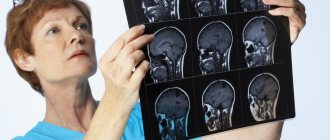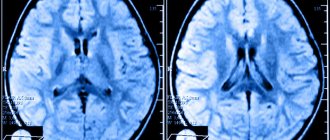What are cognitive functions?
Cognitive function is more than just memory. These include many other properties of the brain that we usually do not pay attention to. But once you lose even one of them, your quality of life drops sharply.
Cognitive functions are:
- memory;
- speech;
- ability to concentrate;
- the ability to recognize objects (by sight, hearing, touch);
- the ability to make purposeful movements.
Often one area of cognitive function suffers while others remain intact. This condition does not greatly interfere with a person’s adaptation and independent life - in this case we are talking about cognitive disorders. When a disorder occurs in several areas, and a person becomes socially maladapted and dependent on the environment, it is worth talking about dementia.
Mild cognitive impairment
The pre-dementia condition is a mild cognitive impairment. In other words, mild impairments of cognitive functions are pathologies of higher brain functions, which are characterized primarily by vascular dementia, which goes through a series of stages in its development, determined by a consistent increase in symptoms - starting with mild impairments of the functions of the cognitive sphere, mainly memory, and ending with severe impairments - dementia.
According to the recommendations of the international classification of diseases, a diagnosis of mild cognitive disorder is possible in the presence of the following symptoms: deterioration in memory function, attention or decreased learning ability,
When performing mental work, high fatigue is observed. At the same time, memory impairment and disruption of other brain functions do not lead to atrophic dementia and are not associated with delirium. The listed disorders are of cerebrovascular origin.
The clinical manifestations of this disorder correspond to a stable cerebrasthenic syndrome, which essentially refers to psychopathological conditions reflecting disorders of various areas of the psyche, including cognitive functions. However, despite this, cerebrasthenic syndrome is characterized by the external safety of patients, the absence of severe impairments of mental, critical and prognostic processes, the illusion of instability, patency of asthenic disorders.
Diagnosis of this disorder is based on the results of clinical examinations and the findings of experimental psychological research.
Mild cognitive disorder is differentiated from organic disorders by the fact that disturbances in the functioning of the cognitive sphere do not occur in conjunction with emotional (affective instability), productive (! paranoia) and behavioral disorders (inadequacy).
Why is dementia dangerous?
In addition to the extremely unpleasant fact of a decrease in a person’s intellectual abilities, this condition is dangerous due to changes in his behavior, which can become threatening both for the patient himself and for others. Moreover, as the disease progresses, patients become dependent on caregivers, and it is the quality of care that determines their life expectancy.
In fact, lack of nutrition, exercise and hygiene often causes death in people with dementia.
Cognitive distortions (dissonance)
Cognitive dissonance is not just a fancy phrase that only applies to scientists and professors. We ourselves often encounter this .
This is a state in which contradictions arise:
- knowledge;
- opinions;
- beliefs.
During a cognitive distortion, a person experiences confusion, anxiety, awkwardness, stress, feelings of shame and guilt, or even anger - psychological discomfort . For example, there is a beggar sitting in a pedestrian crossing to whom you gave some money. She reaches for them, and an expensive watch is shown on her hand.
You are confused at first because you thought the person needed financial support. But it turns out that he may be richer than you yourself. At first you find yourself in a stupor, which can then turn into aggression because you have been fooled.
Dissonance (what is it?) arises for the following reasons :
- the discrepancy between a person’s knowledge of an object, phenomenon, other people and really what they are;
- discrepancy between the acquired experience and the situation that was repeated, only in a different way;
- discrepancy between personal opinion and the point of view of others, which pops up randomly;
- maintaining traditions and beliefs, if you yourself do not sincerely respect and believe them;
- logical inconsistency of facts.
What to do if this strange cognitive dissonance happens to you? First you need to reduce the significance of this condition. After all, there is an explanation for everything that is simply not available to you at the moment.
To do this, you need to look for new information about the subject of cognitive distortion . Study it in more detail, or talk about it with other people. Perhaps you just had a small piece of knowledge and this was a great opportunity to expand it.
You shouldn't have very constrained beliefs . You must absorb and notice information of various formats, study everything around you. With this approach to life, it is unlikely that anything will surprise or greatly offend. You will simply stumble upon new knowledge that you will immediately take note of.
Signs of impending dementia
Like any other disease, cognitive disorders are much easier to prevent or slow down in the early stages. What to pay attention to and when to seek medical help:
- forgetfulness, difficulty maintaining attention;
- narrowing the circle of interests and circle of contacts;
- irritability, tearfulness or euphoria;
- sloppiness and untidiness in appearance, at home, at work;
- difficulty in orientation - both in time and place;
- reducing criticism of one’s own condition.
How to develop cognitive thinking
Immediately after birth, the child begins to perceive and explore the world. But he does this at his own level, depending on his age and whether his parents work with him.
There are the following types of cognitive thinking:
- Visual and effective (up to 3 years) - the child looks at everything around him, touches it, sometimes even tries to lick it. That is, it uses all the simplest ways to find out about the objects around it. The role of mom and dad at this stage is to show the child various interesting objects, name them, tell them in an accessible language about their properties and method of use, and let them study it themselves.
- Visual-figurative (up to 7 years) – the child learns to complete assigned tasks and solve problems using logic. Parents should play educational games with him for fine motor skills, memory, attention and imagination. Also teach rules of behavior, which also develops cognitive thinking.
- Abstract (after 7) - the student learns to understand and imagine abstract things (what is this?) that cannot be seen or touched.
But what should an adult do? Is the current level of development of memory or thinking really the limit ? No, even at 40 or 60 years old you can continue to work on your cognitive abilities.
The love of learning about the world around us and ourselves contributes to the improvement of these brain functions.
Some recommendations that are directly aimed at developing thinking :
- Learn a foreign language.
- Choose a different road to get to work or school.
- Do familiar things with your other hand (for right-handed people - left, for left-handed people - right).
- Do crossword puzzles.
- Draw even if you don't know how. Make it more difficult: take the pencils in both hands and continue to draw something.
- Say different words out loud or silently in reverse.
- If you need to calculate simple equations, do it in your head, without the help of a calculator or paper.
- In order to train your memory, before going to bed, you need to remember in detail how the whole day went. You can also reproduce an autobiography from childhood. Or in reverse order: from today until the moment they crawled on the floor for a toy. You can remember either simply in your head, or by telling someone, or writing it down in a notebook.
- Watch various films and read books, of course.
- There are many applications on our smartphones that are directly aimed at developing certain cognitive functions.
Which specialist should I contact?
There are many reasons that cause cognitive impairment. Among the main ones, it is worth highlighting, of course, vascular dementia and Alzheimer's disease. However, many other neurological conditions are accompanied by a decrease in cognitive functions: Parkinson's disease, Huntington's disease, prion diseases, rare forms of dementia - dementia with Lewy bodies, frontotemporal dementia. These conditions are borderline, they are mainly dealt with by a neurologist, but in case of depression, inappropriate behavior, or psychoproductive symptoms, the help of a psychiatrist may be required.
The opposite situation also happens.
Sometimes mental disorders can mimic cognitive impairment.
Thus, depression very often imitates cognitive disorders, because with depression, performance, the ability to assimilate new information are significantly reduced, the desire to communicate with people and take care of oneself disappears. In a situation of “pseudo-dementia,” treatment of depression leads to the restoration of cognitive abilities.
Three stages of cognitive impairment
Such violations are usually classified according to the severity of the consequences. Cognitive disorders may be of the following nature:
- With mild disorders, minor changes are observed that fall within the established norms for a specific age group. Such disorders do not create problems for a person in everyday life. At the same time, people themselves or those around them may notice such changes.
- Moderate by changes in cognitive functions that go beyond existing norms. However, such violations do not affect the person’s condition and do not cause maladjustment in his everyday life. Moderate disorders usually manifest themselves as problems in performing complex intellectual tasks.
- The most dangerous type of cognitive personality disorder is dementia, or dementia . This condition is accompanied by significant changes in memory and other brain functions. Such disorders are pronounced and have a direct impact on a person’s daily life.
Reversible dementias
Some neurological and somatic diseases can lead to dementia. With timely diagnosis and treatment, the prognosis is positive.
Potentially reversible dementia may develop in the following cases:
- brain tumors;
- paraneoplastic process, with very different localization of the primary disease;
- severe form of diabetes mellitus;
- severe hypothyroidism;
- severe forms of somatic diseases;
- normal pressure hydrocephalus;
- chronic alcoholism;
- addiction;
- severe deficiency of vitamin B12 (cyanocabalamin) and folic acid (vitamin B9), vitamin B1 (thiamine);
- long-term use of large doses of drugs that contribute to cognitive decline;
- HIV and syphilis.
The influence of modern technologies on a child’s cognitive development
It cannot be said that if “virtual” information is abused, abstract thinking completely atrophies. But it becomes more difficult for the child to use it, build his own or understand other people’s logical relationships. But real life, where he will need these qualities, takes place outside the screen of a smartphone and computer.
High-quality communication, among other things, implies, for example, answers to endless children's questions that a child asks as he develops.
With the development of Internet technologies, children have gained wide access to all the information that humanity has accumulated over tens of thousands of years of its existence. But will they become smarter from this? The individual level of knowledge, according to the observations of experts, is decreasing, largely due to the fact that the new generation does not need to accumulate and interpret information on their own, when Internet technologies are available for this. But let’s not forget that technology is only a means, a useful tool for those who know how to use it, that is, perceive, compare and process the information received for the purposes they need. It turns out that children are receiving technology that allows them to do without abstract thinking and analytical abilities, but at the same time deprives them of the opportunity to reap its benefits. It is difficult for such children to create associative connections, their horizons are narrowed, so a general developmental delay soon begins. It is difficult to say what reasons it is primarily due to, organic (certain areas of the brain have not developed) or cultural, but based on the obvious, we can make an assumption in favor of the latter. Therefore, parents should pay attention to quality communication with their child, and not replace it with technical surrogates. High-quality communication, among other things, implies, for example, answers to endless children's questions that a child asks as he develops. In this case, it is not the reliable answers that are important, but the very fact of feedback from your child.
Diagnosis of dementia
Based on the severity of symptoms, cognitive impairment is divided into:
- moderate cognitive impairment (self-care is preserved, neuropsychological testing reveals significant impairments);
- dementia - mild, moderate or severe (self-care is impaired, neuropsychological testing reveals significant impairments).
Some researchers identify a stage of mild (mild or subjective) cognitive impairment (MCI), when the patient actively complains of forgetfulness, inattention, and inability to cope with something, but neuropsychological testing determines normative indicators of higher brain functions (HMF) or individual minor difficulties in 1-2 cognitive areas, without disturbing the general cognitive status. Such conditions may be a manifestation of depression, increased anxiety, the result of situational fatigue, or the first preclinical signs of a neurodegenerative brain disease (for example, Alzheimer's disease).
If there are complaints of memory loss, clinical examination of patients is aimed at:
- establishing the fact and assessing the severity and nature of cognitive impairment: neuropsychological testing - targeted assessment of blocks of higher brain functions, determination of the so-called pattern of cognitive impairment, which has its own characteristics in various diseases;
- identification of other symptoms of damage to the nervous system: - thorough neurological examination; — a detailed analysis of the patient’s life history, including hereditary history, data on education, professional activities, bad habits, previous injuries and diseases; — instrumental and laboratory examination to assess the condition of the brain and risk factors for damage to the nervous system and exclude causes of potentially reversible dementia.
Before visiting a neurologist, if the patient has memory complaints, a number of examinations can be performed:
- UAC;
- KAM;
- detailed biochemical blood test (total protein, creatinine, glucose, glycated (glycosylated) hemoglobin, total and direct bilirubin, liver enzymes (AST, ALT, CK, ALP, GGT), total cholesterol, lipid spectrum, potassium, sodium, calcium, vitamin D, vitamin B12, folic acid, TSH);
- MRI of the brain without contrast on a device with a power of at least 1.5 Tesla, with the obligatory performance of coronal sections to assess the volume of the hippocampi (the results are best presented on disk in DICOM format);
- ECG;
- UZDS BCA.
It is also useful to analyze the following patient data:
- bad habits;
- list of medications taken regularly;
- list of usual food products;
- drinking diary;
- physical activity diary, daily routine.
Even with severe chronic disease, the earliest possible diagnosis of the disease and an integrated approach to treatment significantly improves the prognosis of patients and increases their life expectancy.
Causes of cognitive disorders
Cognitive impairments are functional and organic in nature. Functional disorders in the cognitive sphere are formed in the absence of direct brain damage. Overwork, stress and constant overexertion, negative emotions - all this can be the cause of functional cognitive disorders. Functional cognitive disorders can develop at any age. Such disorders are not considered dangerous and always disappear or their manifestations are significantly reduced after the cause of the disorders is eliminated. However, in some cases, drug therapy may be required.
Organic conditions in the cognitive domain arise from brain damage resulting from disease. They are more often observed in older people and usually have more stable features. However, proper therapy even in these cases helps to achieve improvement in the condition and prevents the increase in disorders in the future.
The most common causes of organic pathologies in the cognitive sphere are: insufficient blood supply to the brain and age-related decrease in brain mass or atrophy.
Insufficient blood supply to the brain can occur due to hypertension, cardiovascular pathology and strokes. Therefore, timely diagnosis of these diseases and their correct treatment are very important. Otherwise, serious complications may occur. Blood pressure, maintaining normal blood sugar and cholesterol levels should be given special attention. There are also vascular cognitive disorders that develop as a result of chronic cerebral ischemia, repeated strokes, or a combination thereof. Such pathologies are divided into two options: disorders arising as a result of pathology of small vessels, and disorders resulting from pathology of large vessels. Neuropsychological features of the detected conditions, reflecting their relationship with disruption of the frontal lobes of the brain, will indicate the vascular etiology of cognitive disorders.
Vascular cognitive personality disorders are quite common today in the practice of neurological pathologies.
With brain atrophy, due to age-related changes, more pronounced pathologies of cognitive functions are formed. This pathological condition is called Alzheimer's disease and is considered a progressive disease. However, the rate of growth of pathologies in the cognitive sphere can vary significantly. Mostly, symptoms are characterized by a slow increase, as a result of which patients can maintain independence and independence for many years. Adequate therapy is of great importance for such patients. Modern methods of therapy help to achieve improvement in the patient’s condition and long-term stabilization of symptoms.
Pathologies in the cognitive sphere can also be caused by other brain diseases, cardiovascular failure, diseases of internal organs, metabolic disorders, alcohol abuse or other poisoning.
How is dementia treated at the Rassvet Clinic?
The Rassvet Clinic welcomes a multidisciplinary approach to this problem. A thorough examination by a doctor, a lengthy conversation, testing on a number of scales and the joint work of a neurologist and psychiatrist help to make the correct diagnosis, and additional examinations can identify the specific cause of cognitive decline. This is what helps to develop further effective treatment and rehabilitation tactics.
Drug therapy for dementia can reduce the rate of progression of the disease and prolong the patient's life. Active learning of new skills, constant memory training (cognitive stimulation) and emotional support of loved ones are also of fundamental importance in the treatment of dementia - especially at the stage of moderate cognitive impairment.
How to improve the patient's condition?
When selecting a treatment regimen for a patient, it is important to first establish the cause of the development of cognitive disorder. Therefore, after assessing the mental status, a comprehensive examination of the patient is carried out.
Treatment tactics for disorders are determined based on the severity of the disease and the cause of the brain dysfunction. In the treatment of mild to moderate dementia caused by Alzheimer's disease or vascular pathologies, acetylcholinesterase inhibitors or Memantine are used. However, the effectiveness of these drugs has not yet been proven. They are prescribed mainly to prevent further progression of the pathological process and the development of dementia.
In case of diagnosing vascular pathologies that provoke a failure of brain activity, the following are used:
- phosphodiesterase inhibitors promote vasodilation, which leads to normalization of blood circulation;
- α2-adrenergic receptor blockers suppress the actions of the sympathetic nervous system, which lead to the narrowing of blood vessels.
Actovegin is used to restore neurometabolic processes. The drug increases the plasticity of brain neurons, which has a positive effect on cognitive functions.
In addition to these medications, in the presence of neurological disorders, various therapeutic tactics are used to correct the patient’s behavior. It takes a lot of time to complete this task, since such treatment involves a consistent transformation of the human psyche.
Tactics for managing a patient with impaired cognitive functions:
Prevention and treatment
In vascular and neurodegenerative pathologies, intellectual impairment is irreversible. However, they are reversible in cases of metabolic disorders and metabolic diseases. Thus, the cause of metabolic pathology is determined and symptomatic and pathogenetic therapy is carried out.
The psychological approach to anxiety and dissociative disorders consists of attempts to unite all mental processes together and recreate the integrity of consciousness. This is done with the help of psychotherapy: cognitive behavioral therapy, hypnosis, psychodynamic therapy methods.
To relieve symptoms of depression and anxiety, the patient is prescribed antidepressants and anxiolytics. This is symptomatic therapy. There is not a single medicine that could recreate a single and continuous stream of consciousness and the integrity of mental functions.
Prevention of cognitive and dissociative disorders is nonspecific
Each cause of disease (stroke, neurodegeneration, demyelination, chronically poor circulation) should be taken into account and prevented
Didn't find a suitable answer? Find a doctor and ask him a question!
Treat the patient, not the disease
This advice was given to us by the father of medicine, Hippocrates, so we don’t do anything differently. In recommendations to the patient and medical interventions, the first ones are always measures to harmonize lifestyle with a possible increase in physical activity, planning work and rest, giving up bad habits, and a diet balanced in terms of quality and caloric content of food products. In particular, with regard to restrictions on table salt, refined carbohydrates and animal fats. An important place belongs to sanatorium-resort treatment.
Statins are recommended for patients with atherosclerosis. For arterial hypertension, angiotensin-converting enzyme inhibitors, beta-adrenergic receptor blockers, retard forms of calcium channel blockers, diuretics, and other drugs are prescribed. In case of atherosclerosis, it is important to achieve the recommended levels of blood lipids, and in case of arterial hypertension, normal blood pressure numbers with the restoration of its daily frequency. At a high risk of thromboembolic complications (atrial fibrillation, etc.), acetylsalicylic acid, thienopyridines, low molecular weight dextrans and anticoagulants are used.
For vascular encephalopathy and Alzheimer's disease, this therapy is supplemented with antioxidants, choline alfascerate - a donor for the biosynthesis of acetylcholine in the presynaptic membranes of cholinergic neurons involved in cognitive functions, analogues of the ACTH fragment without hormonal properties, but with a neuroprotective effect, and other drugs that improve cerebral circulation.
If vascular disorders are based on anatomical causes associated with atherosclerotic plaque, stenosis, or other formations, surgical interventions are recommended. However, medical interventions are not limited to this. Because the most important thing is not said - the indispensable need, if not restoration, then improvement of the cognitive functions of the brain. Whenever cognitive impairment is diagnosed, nootropic drugs (nootropics) are used. Nootropics increase the energy metabolism of the brain, have neurotrophic, neuroprotective and neurotransmitter effects, improve memory, attention and learning ability.
The multicomponent action of these drugs, which regulate many metabolic, neurotransmitter and other changes in the body, expands compensatory capabilities and increases the brain’s resistance to harmful influences. Recently, new generations of drugs with combined nootropic, vasoactive, polyneurotransmitter, neuroprotective, antioxidant and other positive effects have appeared on the pharmaceutical market. With their use, it is possible to achieve not only an improvement in cognitive functions, but also a significant increase in the duration and quality of life of patients.
These drugs are especially indicated for transient ischemic attacks, for prevention and in the recovery period after acute cerebrovascular accident, cerebral stroke, and in all cases of diabetic angioencephalopathy. They are used for toxic, post-traumatic, post-radiation, dysmetabolic and other forms of encephalopathies.
They are indicated for Parkinson's disease, all forms of dementia, migraine, vestibular disorders, hearing impairment of vascular origin, ischemic damage to the optic nerve, and many other similar conditions. They are used to correct mental retardation in children and to enhance mental activity in old age.
Such drugs with combined nootropic, vasoactive and other positive effects are used for urgent and planned inpatient and outpatient therapy in pediatric, adult and geriatric clinics. Equally, neurological, psychiatric and therapeutic. They, and this is important to remember, are excellent helpers for chronic fatigue syndromes and emotional burnout, in general in all cases of mental stress, when there is a need to improve memory, attention and concentration.
Treatment of cognitive impairment
The choice of treatment tactics depends on the cause of occurrence (specific disease) and the severity of cognitive impairment.
It is necessary (if possible) to carry out treatment aimed at correcting the pathological mechanisms occurring in the body. For example, with vascular changes in the brain, lipid-lowering therapy is necessary (to stop the course of atherosclerosis); Actovegin, Mexidol, and nicergoline help improve blood circulation in the vessels of the brain.
To treat cognitive impairment itself, drugs such as donepezil, rivastigmine, galantamine, and memantine are used.
Vascular and atrophic dementia
Brain lesions, it was agreed, may have a vascular origin, or may be associated with a pathological process in the brain itself, as, for example, in Alzheimer's disease. Therefore, the entire variety of lesions, which often intersect in everyday life, are conventionally classified into vascular and atrophic. As if vascular lesions do not lead to atrophic changes in the brain. In accordance with this, dementia is also classified into vascular and atrophic. Differentiation is carried out using the Khachinsky scale.
To do this, the patient is determined for signs of dementia and the total number of points is calculated in accordance with the scale. The criterion for atrophic dementia is the sum of points does not exceed 4, vascular - more than 7. The scale is a scale, but vascular dementia, like atrophic dementia, must also be confirmed by computer X-ray (CT) or magnetic resonance imaging (MRI).
Clinical picture
Cognitive impairment syndrome manifests itself as a set of specific symptoms. Experts involved in the study of this disease say that the clinical picture of this disease is interconnected with the condition of certain parts of the brain.
Damage to the left hemisphere causes the patient to have difficulty reading, writing and counting. At certain stages of the disease, difficulties with logical thinking, computational abilities and analysis appear. Damage to the right hemisphere leads to difficulties with orientation in space. In addition, the patient has problems with creative abilities. The lack of the ability to dream, fantasize and show one’s own emotions leads to the fact that a person is completely locked in his own world.
Such disturbances can lead to problems with the perception of sounds and smells. Also, the frontal lobes of the brain are responsible for the emotional perception of the surrounding reality and for memories. In a situation where the disease is accompanied by damage to the parietal lobe, the patient experiences difficulty with orientation, reading and writing. The occipital lobes are responsible for visual perception, the ability to analyze, recognize people and surrounding objects. When the cerebellum is damaged, the patient suffers from speech impairment and often exhibits inappropriate behavior.
Symptoms of the disease increase with intense intellectual stress











